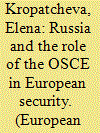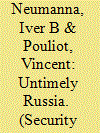| Srl | Item |
| 1 |
ID:
114212


|
|
|
|
|
| Publication |
2012.
|
| Summary/Abstract |
This essay explores Russia's Organization for Security and Co-operation in Europe (OSCE) policy, by focusing on two questions. First of all, analysts have noted Russia's disinterest and obstructive policies towards the Organization. Thus, the question is what - if anything - does the Russian Federation still want from the OSCE? Secondly, does the OSCE still serve as a forum for dialog? These two issues are studied on the basis of rational institutionalism and realism. The essay demonstrates that Russia is still interested in the OSCE, but its policy has become more pragmatic, selective and instrumentalist. It includes obstructive and constructive strategies. At the same time, today the Russian Federation ascribes less significance to the Organization in European security. This is predetermined not only by its inability to push its interests through the OSCE, but also by the declining interest of other participating States in the Organization. The differences between OSCE participants have turned it into a battlefield of interests in many areas.
|
|
|
|
|
|
|
|
|
|
|
|
|
|
|
|
| 2 |
ID:
104081


|
|
|
|
|
| Publication |
2011.
|
| Summary/Abstract |
This article draws on Pierre Bourdieu's sociology to explain how a lack of fit between a repertoire of bodily practices accumulated through history, on the one hand, (here, Russian habitus) and the field in which it is employed, on the other, (here, diplomacy) can take shape in world politics. Such "hysteresis" provides a longue durée reading that challenges both the realist idea that similar outcomes are due to invariant structures and the constructivist idea that structures "socialize" states. Social stability stems from agency, more specifically, from habitus. Our empirical examples are breaking points in Russian relations with neighbors: the Rus' and the Eurasian steppe empires (ca. 800-1500), Muscovy's diplomatic interactions with Europe, and Russia's bid to join European international society and situation during the twentieth century. In each case, Moscow's relentless quest for equal status prompted quixotic practices that were often dismissed by Western countries and hampered the security of both parties.
|
|
|
|
|
|
|
|
|
|
|
|
|
|
|
|